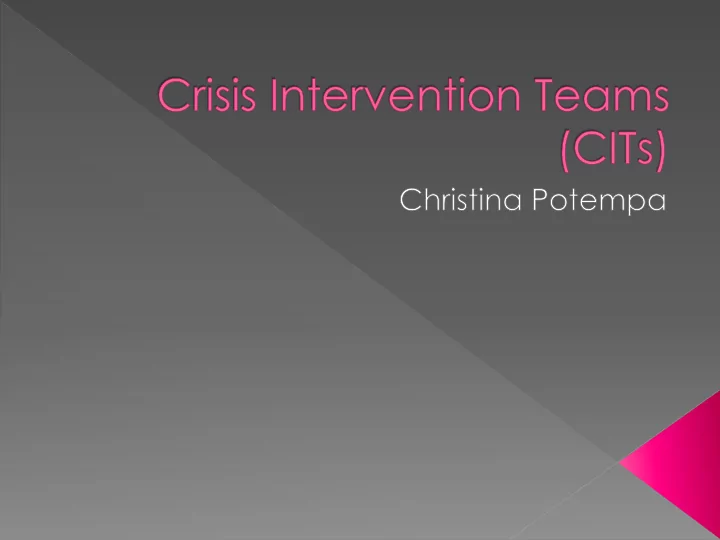

The Crisis Intervention Team (CIT) is an innovative first-responder model of police-based crisis. Intervention with community, health care, and advocacy partnerships.
CIT was started in 1988 by Lt. Sam Cochran of the Memphis Tennessee Police Department. Lt. Cochran decided to develop an approach that reduces blaming someone or something Less than 25 years later, nearly every state has at least one CIT, and there are international conferences about CITs.
This program provides law enforcement based crisis intervention training for helping those individuals with mental illness. Involvement in CIT is voluntary and based in the patrol division of the police department. CIT works in partnership with those in mental health care to provide a system of services that is friendly to the individuals with mental illness, family members, and the police officers.
http://www.cit.memphis.edu/information _files/CoreElements.pdf Partnerships Community ownership Policies and procedures
The Memphis Police Department has approximately 225 CIT officers who participate in specialized training under the instructional supervision of mental health providers, family advocates, and mental health consumer groups.
Crisis response is immediate Arrests and use of force has decreased Underserved consumers are identified by officers and provided with care Patient violence and use of restraints in the ER has decreased Officers are better trained and educated in verbal de-escalation techniques Officer’s injuries during crisis events have declined Officer recognition and appreciation by the community has increased Less “victimless” crime arrests Decrease in liability for health care issues in the jail Cost savings
http://fox6now.com/2014/11/21/this- training-has-given-us-more-tools- milwaukee-police-members-complete- cit-class/
Do you think that these teams are a positive or negative aspect to be added to the police departments? Should they be required in every police department? Why or why not?
An increase in illegal narcotic/alcohol abuse and the “ deinstitutionalzation ” of mentally ill citizens has caused many to become homeless and potentially more violent which increases the chances of involvement with law enforcement. This increases the possibility for excessive force complaints and the inevitable backlash from the community.
According to the Substance Abuse and Mental Health Services Administration, 20 to 25% of the homeless population in the United States suffers from some form of severe mental illness. In comparison, only 6% of Americans are severely mentally ill
Approximately 15% of men and 30% of women in local jails have a serious mental illness. Only one in three prison inmates and one in six jail inmates receive any form of mental health treatment.
https://www.youtube.com/watch?v=4Sb VP-JvxPk
After watching this video, how do you think the officers handled the situation? Why? What other things could the officers have done to help this man out?
Enraged by the death of Randy, he implements that all Miami departments should undergo CIT training 4/5 deaths of mentally ill or officers happened in Alvarez’s department because they are the only department without the training
Undergoing CIT training helps to eliminate stigmas given to people with a mental health issue. It gives officers, and even people, a new outlook on the field of mental health and how severe certain symptoms can get.
CITs are still full force in many departments across the nation. They have helped to save many lives of police officers, and people who suffer from mental illnesses.
How long does it take to undergo training? › 40 hours
How extensive is the training? › Variety of topics from mental illnesses, elderly issues, homelessness issues and de-escalation techniques.
Have you seen a great deal of change when handling cases where the person is mentally ill after going through this training? › I have not gone through the whole course just an abbreviated version at this point. However, the course teaches helpful techniques, empathy, and undersranding.
Do you feel it helps keep you, as the officer, and the person safer as a result of this training? › It is certainly a good tool like many others that we possess. Officers and the public are safer as a result.
What is the biggest impact (positive and negative if possible) of this training when handling mentally ill? › Officers are more able to find alternative methods to help those in crisis beyond emergency detention.
Alice has bipolar 1 disorder, and lately has been locking herself in her room saying how life would be better without her, and her boyfriend, Greg, can do so much better than what she offers him. Greg calls 911 dispatch stating all of the above, and how Alice has not taken her medicine lately which could be why she is agitated and angry one day, and high energy on a different day. Discuss how having CIT intervene this situation would be a positive or negative thing.
https://www.nami.org/Get-Involved/Law-Enforcement- and-Mental-Health http://www.citinternational.org/ http://www.citwisconsin.org/ http://www.ncbi.nlm.nih.gov/pmc/articles/PMC3769782/ http://www.wisn.com/news/crisis-intervention-training- announced-for-milwaukee-police-officers/30309430 http://www.cableweb.org/resources/the-memphis-model http://www.nationalhomeless.org/factsheets/Mental_Illnes s.pdf http://www.jaapl.org/content/35/4/406.full http://www.namifoxvalley.org/media/Wisconsin_CIT_map. pdf http://www.citinternational.org/cit-overview/233-the- crimes-of-the-mentally-ill-a-creative-response.html
Recommend
More recommend